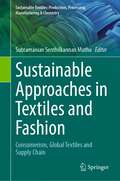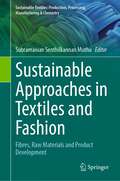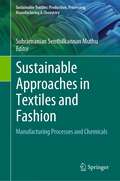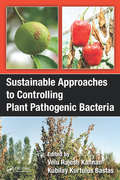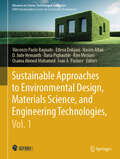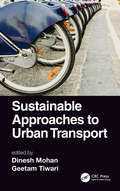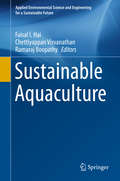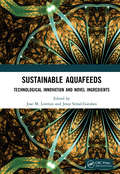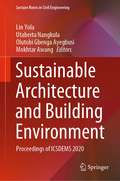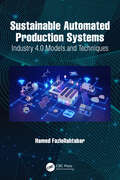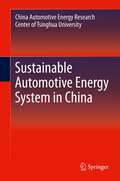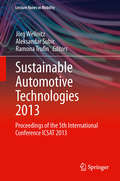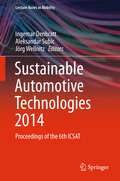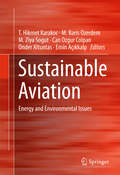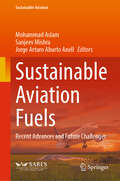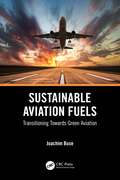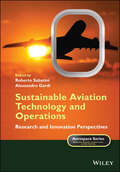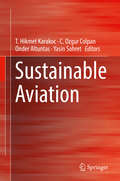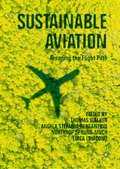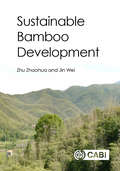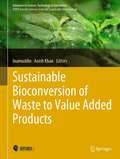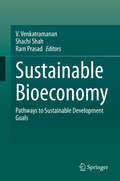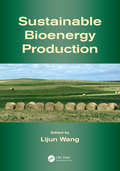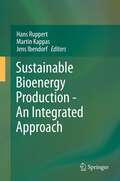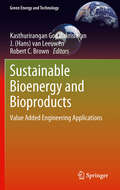- Table View
- List View
Sustainable Approaches in Textiles and Fashion: Consumerism, Global Textiles and Supply Chain (Sustainable Textiles: Production, Processing, Manufacturing & Chemistry)
by Subramanian Senthilkannan MuthuThis second volume in this set of books discusses various sustainable approaches in textiles and the fashion sector with a focus on consumerism and the supply chain. Sustainability is one of the important aspects in today’s industrial context, and is no exception to textiles and fashion. Sustainability and strict adherence to the principles of sustainability has become as one of the essential needs again for any industrial sector including textiles and fashion. There are countless measures in terms of various approaches to make the textiles and fashion sector sustainable. These measures, but not limited to, ranging from innovating and implementing new fibres and raw materials, introducing innovative manufacturing methods, chemicals, processes to focus on all the possible stages of a textile product’s life cycle from cradle to grave. These approaches include making the textiles and fashion sector circular and also development of new products from sustainable raw materials/processes or combination of both.
Sustainable Approaches in Textiles and Fashion: Fibres, Raw Materials and Product Development (Sustainable Textiles: Production, Processing, Manufacturing & Chemistry)
by Subramanian Senthilkannan MuthuThis third volume in the set of books is dedicated to various sustainable approaches in textiles and fashion sector with a focus on fibres and raw materials employed. Sustainability is one of the important aspects in today’s industrial context, which is followed by every industrial sector with no exception to textiles and fashion. Sustainability and strict adherence to the principles of sustainability has become as one of the essential needs again for any industrial sector including textiles and fashion. There are countless measures in terms of various approaches to make the textiles and fashion sector sustainable. These measures, but not limited to, ranging from innovating and implementing new fibres and raw materials, introducing innovative manufacturing methods, chemicals, processes to focus on all the possible stages of a textile product’s life cycle from cradle to grave. These approaches include making the textiles and fashion sector circular and also development of new products from sustainable raw materials/processes or combination of both.
Sustainable Approaches in Textiles and Fashion: Manufacturing Processes and Chemicals (Sustainable Textiles: Production, Processing, Manufacturing & Chemistry)
by Subramanian Senthilkannan MuthuThis fourth volume in the series presents various sustainable approaches in the textile and fashion sector with a focus on manufacturing processes and chemicals. Sustainability is one of the important aspects in today’s industrial context, which is followed by every industrial sector with no exception to textiles and fashion. Sustainability and strict adherence to the principles of sustainability has become as one of the essential needs again for any industrial sector including textiles and fashion. There are countless measures in terms of various approaches to make the textiles and fashion sector sustainable. These measures, but not limited to, ranging from innovating and implementing new fibres and raw materials, introducing innovative manufacturing methods, chemicals, processes to focus on all the possible stages of a textile product’s life cycle from cradle to grave. These approaches include making the textiles and fashion sector circular and also development of new products from sustainable raw materials/processes or combination of both.
Sustainable Approaches to Controlling Plant Pathogenic Bacteria
by V. Rajesh Kannan Kubilay Kurtulus BastasPlant diseases and changes in existing pathogens remain a constant threat to our forests, food, and fiber crops as well as landscape plants. However, many economically important pathosystems are largely unexplored and biologically relevant life stages of familiar systems remain poorly understood. In a multifaceted approach to plant pathogenic behav
Sustainable Approaches to Environmental Design, Materials Science, and Engineering Technologies, Vol. 1 (Advances in Science, Technology & Innovation)
by Ivan A. Parinov D. Jude Hemanth Hasim Altan Ilaria Pigliautile Etleva Dobjani Vincenzo Paolo Bagnato Rim Meziani Osama Ahmed MohamedThis book highlights the sustainable innovation in environmental design, materials science, and engineering technologies. It provides a multidisciplinary approach to addressing contemporary challenges in creating resilient, efficient, and health-promoting built environments. With contributions from leading experts, the book covers a wide range of topics including architectural design, urban planning, sustainable materials, and renewable energy technologies. Also, it explores sustainable solutions and innovative practices across a range of disciplines essential for the future of our built environment. It examines architectural design, urban planning, and infrastructure, highlighting approaches that promote resilience and efficiency in urban settings. The book aligns with sustainable development goals, providing practical insights and strategies to achieve global sustainability targets. This book focuses on sustainable methodologies in material sciences, exploring the latest advancements in eco-friendly materials and their applications in construction. The integration of renewable energy technologies is thoroughly examined, showcasing how these innovations can reduce environmental impacts and enhance energy efficiency. Additionally, the book addresses the crucial theme of environmental integration and impacts, presenting comprehensive studies on the intersection of engineering technologies with environmental sustainability. Furthermore, it is an indispensable resource for professionals, researchers, and students dedicated to fostering sustainable development across multiple fields. It offers valuable guidance on implementing sustainable practices to create a healthier and more sustainable world.
Sustainable Approaches to Urban Transport
by Geetam Tiwari Dinesh MohanAs cities become increasingly congested, current transport patterns are unsustainable: heavy in energy use, high in economic and environmental cost, and exacerbating inequity between those who can access high-speed travel and those who cannot. Good urban planning develops human-scale cities and encourages modes such as bicycles, increased zones exclusive to pedestrians within cities, and changed fiscal policies to incentivize public over private transport. Equally, it requires good engineering design to manage road use. Sustainable Approaches to Urban Transport brings together contributions from leading international experts in urban planning, transport, and governance who suggest changes to make our cities more sustainable in the face of climate change. All professionals working in transport and engineering and planning students will find an overview of a broad field in this interdisciplinary collection of essays.
Sustainable Aquaculture (Applied Environmental Science And Engineering For A Sustainable Future Ser.)
by Faisal I. Hai Chettiyappan Visvanathan Ramaraj BoopathyThis book is about important relevant recent research topics in sustainable aquaculture practices. A critical assessment of the sustainable fishing methods and the aspect of sustainable aquaculture feed is presented in this volume. A special focus has been given to socio-economic and environmental assessment of aquaculture practices and analysis of carbon footprint under an intensive aquaculture regime. Aquaponics as a niche for sustainable modern aquaculture has been highlighted. The effect of use of pharmaceuticals to prevent fish disease on the surrounding marine environment is an emerging area of concern, and a critical discussion on this aspect is included in the book. The spread of organic waste and nutrients released by fish farms to natural water bodies has raised considerable concerns. Therefore the methods to prevent their dispersion and removal (treatment) have been comprehensively covered in this book. This book is an essential read for academician, researchers, and policy makers in the field of aquaculture.
Sustainable Aquafeeds: Technological Innovation and Novel Ingredients
by Jose M. Lorenzo and Jesus Simal-GandaraAquaculture, the youngest, fastest-growing, and most dynamic protein-producing industry, has the key advantage of efficient use of feed that allows farmed fish to be competitively priced compared with terrestrial proteins. Sustainable Aquafeeds: Technological Innovation and Novel Ingredients explores the present and future evolution of feeds, explains the current challenges for aquaculture, and considers how advances in technologies and ingredients can produce aquafoods for the increasing world population. International contributors to this book provide state-of-the-art information on the profile of the aquafeed industry, including factors affecting supplies and prices of key ingredients for aquafeed production. An entire set of chapters covers the scientific advances and feed industry initiatives in accordance with modern consumer trends, updating readers on the most promising strategies. These include the use of novel ingredients for nutrient supplementation and the enhancement of their use by genetic selection. The authors hope to inspire a collaboration of NGOs, researchers, and private partnerships to replace wild-caught ingredients by accelerating and supporting the scaling of innovative, alternative, aquaculture feed ingredients, including bacterial meals, plant-based proteins, algae, and yeast.
Sustainable Architecture and Building Environment: Proceedings of ICSDEMS 2020 (Lecture Notes in Civil Engineering #161)
by Mokhtar Awang Utaberta Nangkula Lin Yola Olutobi Gbenga AyegbusiThis book presents articles from the International Conference on Sustainable Design, Engineering, Management, and Sciences (ICSDEMS 2020), held in Bali, Indonesia. It highlights recent advances in civil engineering and sustainability, bringing together researchers and professionals to address the latest, most relevant issues in these areas.
Sustainable Automated Production Systems: Industry 4.0 Models and Techniques
by Hamed FazlollahtabarDue to disruptions occurring within production processes as a result of different circumstances, it is necessary to provide a new and safe production system that can be resilient to cope with any crisis, such as a pandemic. New sustainable automated production systems need to be proposed and adopted by industrial managers and this book fulfills that need.Sustainable Automated Production Systems: Industry 4.0 Models and Techniques includes the modern technologies of Industry 4.0 and discusses automated systems, robotic production, sustainable automation, production process automation, and the use of IoT in production. It goes over the circular economy and automated production processes and presents theories and practices associated with mathematical models of process automation in sustainable production. The book also investigates how sustainability in automated production systems using the IoT can present unique circumstances when pandemics or other disruptions are involved.The book includes chapters presenting sustainable production models and automated production using Industry 4.0 technologies and is targeted to help both practitioners and academics.
Sustainable Automotive Energy System in China
by CAERC, Tsinghua UniversitySustainable Automotive Energy System in China aims at identifying and addressing the key issues of automotive energy in China in a systematic way, covering demography, economics, technology and policy, based on systematic and in-depth, multidisciplinary and comprehensive studies. Five scenarios of China's automotive energy development are created to analyze the possible contributions in the fields of automotive energy, vehicle fuel economy improvement, electric vehicles, fuel cell vehicles and the 2nd generation biofuel development. Thanks to this book, readers can gain a better understanding of the nature of China's automotive energy development and be informed about: 1) the current status of automotive energy consumption, vehicle technology development, automotive energy technology development and policy; 2) the future of automotive energy development, fuel consumption, propulsion technology penetration and automotive energy technology development, and 3) the pathways of sustainable automotive energy transformation in China, in particular, the technological and the policy-related options. This book is intended for researchers, engineers and graduates students in the low-carbon transportation and environmental protection field. China Automotive Energy Research Center (CAERC), Tsinghua University, established in 2008, is a university-wide interdisciplinary automotive energy research institution affiliated to Laboratory of Low Carbon Energy (LCE), Tsinghua University. More than 30 researchers are working at CAERC, including six full professors. CAERC's mission is to create and disseminate sustainable automotive energy knowledge, research and development of integrated automotive energy system assessment methodologies and models, and provide technological and policy options for sustainable automotive energy system transformation in China and the world.
Sustainable Automotive Technologies 2013
by Jörg Wellnitz Aleksandar Subic Ramona TrufinThis book captures selected peer reviewed papers presented at the 5th International Conference on Sustainable Automotive Technologies, ICSAT 2013, held in Ingolstadt, Germany. ICSAT is the state-of-the-art conference in the field of new technologies for transportation. The book brings together the work of international researchers and practitioners under the following interrelated headings: fuel transportation and storage, material recycling, manufacturing and management costs, engines and emission reduction. The book provides a very good overview of research and development activities focused on new technologies and approaches capable of meeting the challenges to sustainable mobility.
Sustainable Automotive Technologies 2014
by Jörg Wellnitz Aleksandar Subic Ingemar DenbrattThis volume collects the research papers presented at the 6th International Conference on Sustainable Automotive Technologies (ICSAT), Gothenburg, 2014. The topical focus lies on latest advances in vehicle technology related to sustainable mobility. ICSAT is the core and state-of-the-art conference in the field of new technologies for transportation. Research contributions from the US, Australia, Europe and Asia illustrate the pivotal role of the conference. The book provides an excellent overview of R&D activities at OEMs as well as in leading universities and laboratories.
Sustainable Aviation
by T. Hikmet Karakoc M. Baris Ozerdem M. Ziya Sogut Can Ozgur Colpan Onder Altuntas Emin AçıkkalpThis expansive reference on the use of clean energy technologies in the aviation industry focuses on tools and solutions for maximizing the energy efficiency of aircrafts, airports, and other auxiliary components of air transit. Key topics range from predicting impacts of avionics and control systems to energy/exergy performance analyses of flight mechanics and computational fluid dynamics. The book includes findings both from experimental investigations and functional extant systems, ranging from propulsion technologies for aerospace vehicles to airport design to energy recovery systems. Engineers, researchers and students will benefit from the broad reach and numerous engineering examples provided.
Sustainable Aviation Fuels: Recent Advances and Future Challenges (Sustainable Aviation)
by Mohammad Aslam Sanjeev Mishra Jorge Arturo Aburto AnellSustainable aviation fuels have the potential to make an essential contribution to decarbonizing the aviation sector and play an important role in strengthening the circular bioeconomy. This book presents recent advances and challenges in sustainable aviation fuel, with contributions from a global group of industry experts exploring alternative fuel technologies, feedstocks and conversion processes, combustion performance and emissions, and the technical and environmental challenges of implementing the use of alternative fuels for aviation. The book presents sustainability assessments, including techno-economic analyses and lifecycle assessments on developing sustainable aviation fuels from renewable sources, mainly from second and third-generation biomass feedstocks. Sustainable Aviation Fuels: Recent Advances and Future Challenges provides an excellent overview of the aviation and green energy sectors and is an invaluable resource for researchers and industry practitioners working on commercially viable sustainable aviation fuels. The book will also provide a foundation for graduate and postgraduate students, researchers, and professionals working in the broader fields of sustainable energy.
Sustainable Aviation Fuels: Transitioning Towards Green Aviation
by Joachim BuseSustainable Aviation Fuels discusses the transfer process of aviation to carbon-neutral flights, including how to manage the transition period. It also demonstrates how to develop and design a new approach for environmentally friendly air transport with reduced emissions. Covering the full scope of commercialisation, market considerations, advisements on investments and transition challenges of sustainable aviation fuels (SAF), the book tackles questions related to the cost of changing fuel types, competitive market models that can exist parallel to the oil industry and strategies for airlines to implement. It considers reliability requirements for feedstock suppliers and SAF producers, as well as ways to avoid feedstock shortages. The book will interest aviation industry professionals, fuel producers, airline fuel buyers, airport operators and propulsion engineers working on SAF production. Aviation, aerospace and business students taking courses in propulsion, gas turbine emissions, air transport management, supply chain development and sustainable energy production will find the book useful as well.
Sustainable Aviation Technology and Operations: Research and Innovation Perspectives (Aerospace Series)
by Roberto Sabatini Alessandro GardiSustainable Aviation Technology and Operations Comprehensively covers research and development initiatives to enhance the environmental sustainability of the??aviation sector Sustainable Aviation Technology and Operations provides a comprehensive and timely outlook of recent research advances in aeronautics and air transport, with emphasis on both long-term sustainable development goals and current achievements. This book discusses some of the most promising advances in aircraft technologies, air traffic management and systems engineering methodologies for sustainable aviation. The topics covered include: propulsion, aerodynamics, avionics, structures, materials, airspace management, biofuels and sustainable lifecycle management. The physical processes associated with various aircraft emissions — including air pollutants, noise and contrails — are presented to support the development of computational models for aircraft design, flight path optimization and environmental impact assessment. Relevant advances in systems engineering and lifecycle management processes are also covered, bridging some of the existing gaps between academic research and industry best practices. A collection of research case studies complements the book, highlighting opportunities for a timely uptake of the most promising technologies, towards a more efficient and environmentally sustainable aviation future. Key features: Contains important research and industry relevant contributions from world-class experts. Addresses recent advances in aviation sustainability including multidisciplinary design approaches and multi-objective operational optimisation methods. Includes a number of research case studies, addressing propulsion, aerostructures, alternative aviation fuels, avionics, air traffic management, and sustainable lifecycle management solutions. Sustainable Aviation Technology and Operations is an excellent book for aerospace engineers, aviation scientists, researchers and graduate students involved in the field.
Sustainable Aviation: Energy And Environmental Issues
by T. Hikmet Karakoc Onder Altuntas C. Ozgur Colpan Yasin SohretThis book provides readers with a basic understanding of the concepts and methodologies of sustainable aviation.The book is divided into three sections : basic principles the airport side, and the aircraft side. In-depth chapters discuss the key elements of sustainable aviation and provide complete coverage of essential topics including airport, energy, and noise management along with novel technologies, standards and a review of the current literature on green airports, sustainable aircraft design, biodiversity management, and alternative fuels. Engineers, researchers and students will find the fundamental approach useful and will benefit from the many engineering examples and solutions provided.
Sustainable Aviation: Greening the Flight Path
by Thomas Walker Angela Stefania Bergantino Northrop Sprung-Much Luisa LoiaconoThis book highlights the latest research in the field of Sustainable Aviation. In recent decades, there have been considerable improvements in aircraft efficiency and noise reduction. However, with the demand for both passenger and freight transportation expected to increase significantly in future years, the aviation sector is becoming a growing source of environmental problems and a major contributor to global warming.Focusing on the need to address this mounting problem, this book discusses important new trends and outlines likely future developments in carbon emission reduction, carbon trading, and the impact of emerging technologies, as well as social, legal, and regulatory changes as they pertain to the aviation sector. The book offers an invaluable reference guide for practitioners, regulators, academics, and students alike, in fields ranging from business and engineering to the social sciences. It can be used as a textbook, and will benefit anyone interested in the future of aviation and our planet.
Sustainable Bamboo Development
by Professor Zhaohua Zhu Wei JinThis book presents over 40 cases of bamboo development across 22 major bamboo-industry countries and explores the knowledge gained from their successes and failures. It synthesises experiences and exchanges with country experts from international training courses and consultations, study tours, and seminars. Each case includes observations and summaries of discussions related to the development of bamboo-based industries in a healthy, sustainable way, and the facilitation of strategic and balanced development of bamboo in different global regions. Industrial and artisanal bamboo growing and processing is expanding worldwide and this book brings together key experiences to help inform future developments. This book provides an analysis of bamboo plant features, including strong renewability, fast-growing, and high biomass production. It also reviews important ecological functions of bamboos, such as water and soil conservation, carbon sink and storage, and adaptation to climate change, as well as addressing the diversified culture of bamboo and key issues affecting the sector. Sustainable Bamboo Development: - Is authored by an internationally recognised leading expert in the growth and use of bamboo - Takes a holistic view, covering technical, socio-economic, policy, cultural and business development - Provides practical knowledge to guide the development of bamboo sectors - Gives a clear idea and rich examples of what has been attempted in many countries - Acts as a roadmap for using bamboo as a poverty reduction and environmental security tool Highly illustrated and in full colour throughout, this book is an essential resource for all those interested in bamboo, from private sector investors to governmental and development agencies, academic researchers and students.
Sustainable Bioconversion of Waste to Value Added Products (Advances in Science, Technology & Innovation)
by Inamuddin Anish KhanThis edited book discusses various processes of feedstocks bioconversion such as bioconversion of food waste, human manure, industrial waste, beverage waste, kitchen waste, organic waste, fruit and vegetable, poultry waste, solid waste, agro-industrial waste, cow dung, steroid, lignocellulosic residue, biomass, natural gas etc. Nowadays, the industrial revolution and urbanization have made human life comfortable. However, this requires excess usage of natural resources starting from food and food products, to energy resources, materials as well as chemicals. The excess use of natural resources for human comfort is expected to high fuel prices, decline natural resources as well as cause a huge hike in the cost of raw materials. These factors are pushing researchers to grow environmentally friendly processes and techniques based on inexpensive and sustainable feedstock to accomplish such worldwide targets. Bioconversion, otherwise called biotransformation, is the change of natural materials, for example, plant or animal waste, into usable items or energy sources by microorganisms. Bioconversion is an environmentally friendly benevolent choice to supplant the well-established chemical procedures utilized these days for the production of chemicals and fuels. A variety of alternatives advancements are being considered and are directly accessible to acquire diverse valuable end-products through bioprocesses. This book discusses in detail the process and techniques of bioconversion by focusing on the organic feedstock of animal and plant origin. It brings solutions to the bioconversion of various feedstock into value-added products.
Sustainable Bioeconomy: Pathways to Sustainable Development Goals
by Ram Prasad Shachi Shah V. VenkatramananSustainable development is the most important challenge facing humanity in the 21st century. The global economic growth in the recent past has indeed exhibited marked progress in many countries. Nevertheless, the issues of income disparity, poverty, gender gaps, and malnutrition are not uncommon in the global landscape, in spite of the upward growth of the economy and technological advances. This grim picture is further exacerbated by our growing human population, unmindful resource use, ever-increasing consumption trends, and changing climate. In order to protect humanity and preserve the planet, the United Nations issued the “2030 agenda for sustainable development,” which includes but is not limited to sustainable production and consumption practices, e.g. in a sustainable bioeconomy. The hallmark of the sustainable bioeconomy is a paradigm shift from a fossil-fuel-based economy to a biological-based one, which is driven by the virtues of sustainability, efficient utilization of resources, and “circular economy.” As the sustainable bioeconomy is based on the efficient utilization of biological resources and societal transformations, it holds the immense potential to achieve the UN’s Sustainable Development Goals. This book shares valuable insights into the linkages between the sustainable bioeconomy and Sustainable Development Goals, making it an essential read for policymakers, researchers and students of environmental studies.
Sustainable Bioenergy Production
by Lijun WangGiven the environmental concerns and declining availability of fossil fuels, as well as the growing population worldwide, it is essential to move toward a sustainable bioenergy-based economy. However, it is also imperative to address sustainability in the bioenergy industry in order to avoid depleting necessary biomass resources. Sustainable Bioene
Sustainable Bioenergy Production - An Integrated Approach
by Martin Kappas Hans Ruppert Jens IbendorfThis book focuses primarily on the advantages and implications of sustainable bioenergy production in terms of ensuring a more sustainable world despite its growing energy demands. It addresses a new concept that focuses on the interactions between different uses of agricultural land (for example, agriculture for food, forage or energy and nature conservation) and their ecological, economic and societal impacts. This research concept provides new insights into the competition for resources and the synergies between different land uses. This book seeks to improve people's understanding of bioenergy's potentials for the future. It will be of interest not only to those involved in sustainable energy, but also to environmental planners, agriculture and soil specialists, and environmental policy-makers.
Sustainable Bioenergy and Bioproducts
by Robert C. Brown J. Hans Van Leeuwen Kasthurirangan GopalakrishnanSustainable Bioenergy and Bioproducts considers the recent technological innovations and emerging concepts in biobased energy production and coproducts utilization. Each chapter in this book has been carefully selected and contributed by experts in the field to provide a good understanding of the various challenges and opportunities associated with sustainable production of biofuel. Sustainable Bioenergy and Bioproducts covers a broad and detailed range of topics including: production capacity of hydrocarbons in the plant kingdom, algae, and microbes; biomass pretreatment for biofuel production; microbial fuel cells; sustainable use of biofuel co-products; bioeconomy and transportation infrastructure impacts and assessment of environmental risks and the life cycle of biofuels. Researchers, practitioners, undergraduate and graduate students engaged in the study of biorenewables, and members of the well-informed public will find Sustainable Bioenergy and Bioproducts to be a useful and comprehensive research tool, describing the state of the art and recent developments in this field.
